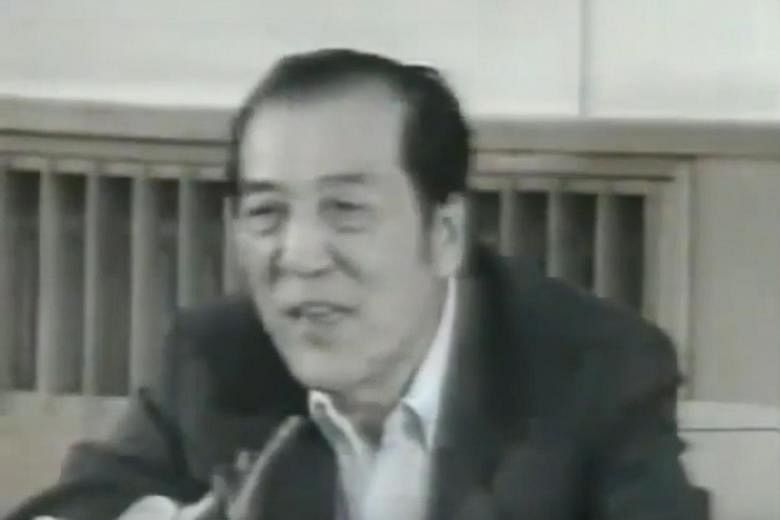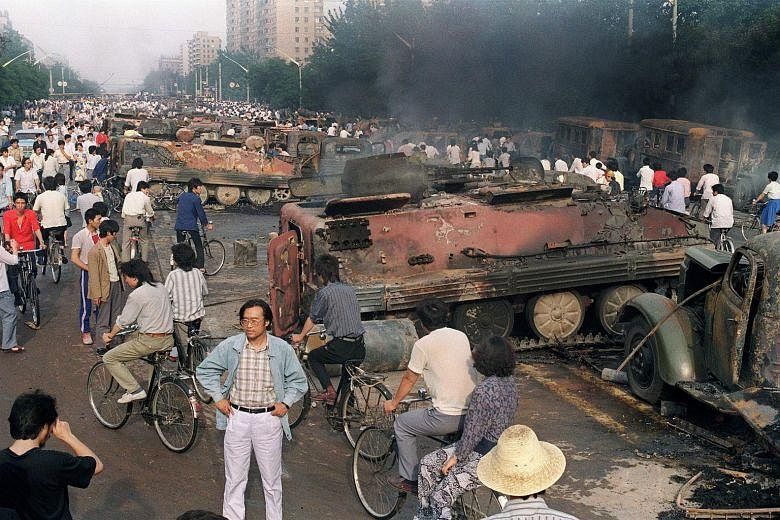BEIJING (NYTIMES)- Yuan Mu, a Communist Party propaganda official who defended the Chinese military's bloody crackdown on pro-democracy protesters around Tiananmen Square in 1989, died on Dec. 13 in Beijing. He was 90.
The Chinese state news media were unusually muted about Yuan's death, perhaps because of sensitivity before the 30th anniversary of the Tiananmen crackdown next year. But Hong Kong and overseas Chinese news outlets reported that a funeral was held for Yuan on Sunday in Babaoshan, the cemetery in Beijing for senior Communist cadres. The reports did not give a cause of death.
Yuan won fame or notoriety as an ally of Li Peng, who was premier during the Tiananmen crackdown, but he first rose to prominence under Zhao Ziyang, Li's more liberal rival. By 1983, Yuan was a spokesman for the government, although a brief biography issued at his funeral said he was formally made spokesman for the State Council, which is China's cabinet, in 1986.
He represented China to the outside world at a time of intense factional battles within the ruling Communist Party and a major restructuring of the Chinese economy.
But Yuan is mainly remembered as the public defender of the government's response to the Tiananmen Square demonstrations in Beijing in June 1989. The repression resulted in the deaths of hundreds of pro-democracy protesters and bystanders, perhaps more, when troops were ordered to open fire on them.
Yuan made the government's first extensive public comments on the crackdown two days later, playing down the military's responsibility for the violence and casualties.
That same month, he told Tom Brokaw of NBC News that "not one person" had died in the square on the day it was cleared of protesters.
John Pomfret, an American journalist who covered the Tiananmen Square clashes for The Associated Press, said the claim might have been accurate - but only because the killing happened outside the square.
"It's a kind of a case study even to this day of how Chinese spokespeople deal with very difficult situations," said Pomfret, who in 2016 published a history of Sino-American relations. Yuan, he added, was the ultimate "flexible Leninist apparatchik" who survived in a Communist bureaucracy by making enormous compromises.
Yuan Mu was born in January 1928 in Zhaoyang, a town in the eastern province of Jiangsu, the Hong Kong newspaper Ming Pao reported. He joined underground activities of the Communist Party while studying at Fudan University in Shanghai and was later a journalist at several party-run newspapers before joining Xinhua, the official news agency, according to the Hong Kong China News Agency.
Yuan moved into government work in the 1970s, puttng his journalistic background to use in drafting party and government documents before becoming a spokesman.
As the government's public face during the tumultuous late 1980s, Yuan had to navigate the leaders' shifting and divided positions as students and intellectuals mobilised to demand political liberalisation and an end to official corruption.
In the early spring of 1989, he spoke sympathetically about the students protesting in Beijing. But a few weeks later, he defended the party leadership's decision to impose martial law in the city - a prelude to the bloody mayhem when soldiers moved into Beijing and other cities to quell the protests.
James R. Lilley, the US ambassador to China from 1989 to 1991, later told an interviewer that Yuan had been Li's "hatchet man" against the student protesters. Lilley also wrote in his 2004 memoir, "China Hands," that Yuan had a reputation among the foreign press corps for being "reptilian."
After the crackdown, many people in China believed that the number of civilians shot or beaten to death by the military was in the thousands. Yuan, however, told reporters on June 6 that an estimated 300 people had been killed, including "troops, thugs and spectators."
He said the injured included not only 2,000 civilians, but also more than 5,000 soldiers.
As for the international outcry over the bloodshed in Beijing, Yuan said China could put up with any reprisals by foreign governments.
"We are not afraid of this," he said. "We Chinese people will not allow them to interfere in China's domestic affairs, either by condemnations or by sanctions."
Zhang Lifan, an independent historian in Beijing, said of Yuan that the events of June 1989 had "nailed him to the pillory of history." "If he had stayed a reporter, he might not have become a high-ranking official," said Zhang, who left the Chinese Academy of Social Sciences after 1989. "But at least he wouldn't have become infamous."
Yuan's performance in June 1989 did not derail his career. He remained a government spokesman even after the Communist Party leader, Zhao Ziyang, was purged later that year for having supported students during the Tiananmen Square protests.
Pomfret said that Yuan's ability to "skate over" a factional battle between Zhao, who supported a more liberal version of Chinese communism, and Li, a conservative hard-liner, testified to his instinct for political survival.
Years after the Tiananmen episode, Yuan played down his role in interviews with reporters.
"I don't much want to mention it - that June 4 disturbance - and I hope people gradually forget it," he told a Chinese television reporter in 1991.
Yuan finished his career as a member of the Standing Committee of the Chinese People's Political Consultative Conference, an advisory body. He stepped down in 2000.
In 2012, after the mother of a 17-year-old who had died in the crackdown asked Yuan to "come clean" about the government's armed suppression of protests, he said he did not know much about it.
"Go and ask someone who really understands the situation," he told Radio Free Asia, a broadcaster funded by the US government.
Chinese state news media have rarely mentioned Yuan over the years, and initial reports about his death were removed from Chinese websites.
Lilley, the former US ambassador to Beijing, wrote in his memoir that Yuan had a daughter who applied for a student visa to the United States. But the Hong Kong China News Agency reported that Yuan had only two sons, citing an interview with one of them, Yang Xiaobei.
That report also said that Chinese leaders, past and present, sent floral tributes to Yuan's funeral, including Premier Li Keqiang, former President Jiang Zemin, and Li Peng, the former premier whose policies Yuan defended.
"Confronted with grave and complex developments internationally and domestically, he thoroughly promoted the policy directions of the party and government," an account of Yuan's life issued at his funeral said, according to the Hong Kong report.
"In particular, at a crucial moment, his stance was firm and clear."


